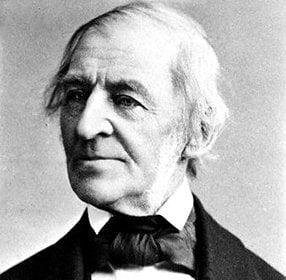The Problem
I like a church; I like a cowl; I love a prophet of the soul; and on my heart monastic aisles Fall like sweet strains, or pensive smiles; Yet not for all his faith can see Would I that cowléd churchman be. Why should the vest on him allure, Which I could not on me endure? Not from a vain or shallow thought His awful Jove young Phidias brought; Never from lips of cunning fell The thrilling Delphic oracle; Out from the heart of nature rolled The burdens of the Bible old; the litanies of nations came, Like the volcano's tongue of flame, Up from the burning core below,— The canticles of love and woe; The hand that rounded Peter's dome, And groined the aisles of Christian Rome, Wrought in a sad sincerity; Himself from God he could not free; He builded better than he knew;— The conscious stone to beauty grew. Know'st thou what wove yon woodbird's nest Of leaves, and feathers from her breast? Or how the fish outbuilt her shell, Painting with morn each annual cell? Or how the sacred pine-tree adds To her old leaves new myriads? Such and so grew these holy piles, Whilst love and terror laid the tiles. Earth proudly wears the Parthenon, As the best gem upon her zone; And Morning opes with hast her lids, To gaze upon the Pyramids; O'er England's abbeys bends the sky, As on its friends, with kindred eye; For, out of Thought's interior sphere, These wonders rose to upper air; And nature gladly gave them place, Adopted them into her race, And granted them an equal date With Andes and with Ararat. These temples grew as grows the grass; Art might obey, but not surpass. The passive master lent his hand To the vast soul that o'er him planned; And the same power that reared the shrine, Bestrode the tribes that knelt within. Ever the fiery Pentecost Girds with one flame the countless host, Trances the heart through chanting choirs, And through the priest the mind inspires. The word unto the prophet spoken Was writ on tables yet unbroken; The word by seers or sibyls told, In groves of oak, or fanes of gold, Still floats upon the morning wind, Still whispers to the willing mind. One accent of the Holy Ghost The heedless world hath never lost. I know what say the fathers wise,-- The Book itself before me lies, Old Chrysostom, best Augustine, And he who blent both in his line, The younger Golden Lips or mines, Taylor, the Shakspeare of divines. His words are music in my ear, I see his cowléd portrait dear; And yet, for all his faith could see, I would not the good bishop be.
Credit
From American Poetry: The Nineteenth Century, Volume I, published by Library of America.
Date Published
01/01/1847

